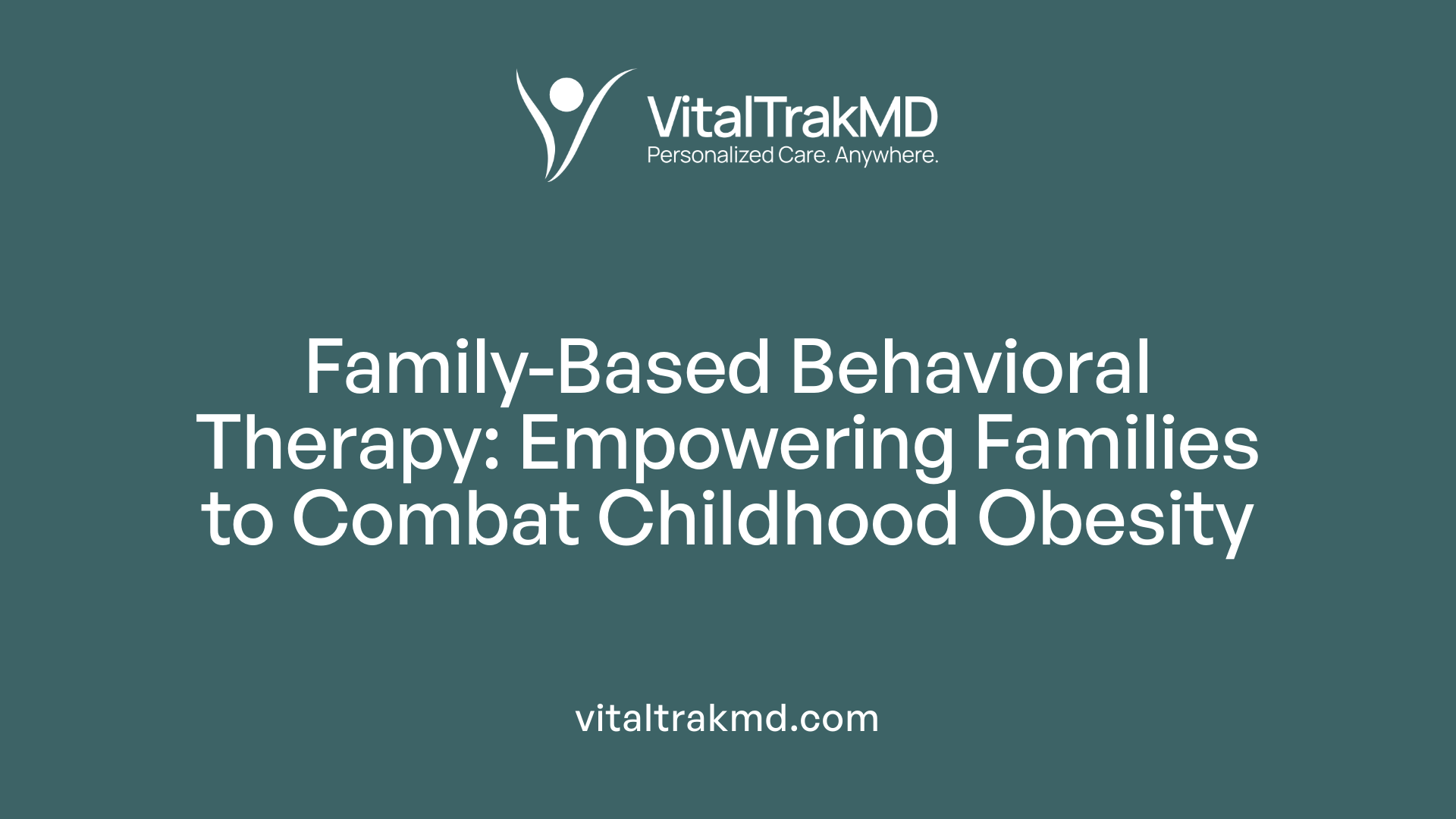How Hybrid Healthcare Encourages Active Family Participation

Introducing Hybrid Healthcare in Family Wellness
Hybrid healthcare models that combine in-person and digital interventions are revolutionizing family wellness programs, especially in managing childhood obesity and promoting sustained healthy behaviors. By integrating technology with traditional care, these programs foster active participation from both children and their parents, addressing barriers to access and enhancing clinical outcomes.
The Foundations of Effective Family Wellness Programs

What are the key components of effective wellness programs?
Effective wellness programs for families address multiple dimensions of well-being, including physical, mental, emotional, and nutritional health. Programs that integrate these aspects holistically tend to be more impactful. Accessibility plays a crucial role; offering virtual or hybrid models alongside traditional in-person options allows more families to participate, especially those lacking local access to quality care.
Strong leadership and organization backing are essential to sustain these programs. This support helps incorporate wellness activities seamlessly into daily routines, such as health education talks, physical activity classes, and skill-building sessions that encourage healthier lifestyles.
Regular evaluation using participant feedback and outcome measures ensures continuous improvement, confirming that programs remain effective and relevant.
Evidence-based strategies for designing wellness and care programs
Family-based behavioral therapy is a proven approach that involves counseling not just children but also their parents, fostering a shared commitment to healthy habits. Programs like DRIVE and its mHealth version illustrate this well, incorporating home-based parent training and digital tools like wireless scales and pedometers.
Digital health solutions enhance accessibility and cost-effectiveness, enabling long-term support and personalized care via telehealth. Evidence shows high satisfaction levels among families using such programs, along with meaningful improvements in children’s BMI scores.
Hybrid care models that combine in-person and virtual sessions strike a balance between flexibility and clinical effectiveness. In managing conditions such as obesity and diabetes, they have demonstrated similar outcomes regarding weight loss and glycemic control compared to fully virtual or entirely in-person models.
Utilizing mobile apps and continuous monitoring technologies allows for real-time tracking of diet, exercise, and health markers, empowering families and providers with timely data to support adherence and adjustments.
By embedding these strategies, family wellness programs can effectively promote sustainable healthy lifestyles and better health outcomes across diverse populations.
Addressing Childhood Obesity with Family-Based Behavioral Therapy

How effective is family-based behavioral therapy for childhood obesity?
Family-based behavioral therapy is a proven effective method for managing weight in children. This approach involves counseling both children and their parents, helping to create a supportive environment at home for healthy habits. Since families play a crucial role in shaping children's behavior, involving parents directly enhances the success of weight management efforts.
What parent training programs support childhood weight management?
Programs like DRIVE focus on training parents to help children at risk for obesity maintain a healthy weight. DRIVE is a home-based program that empowers parents with strategies to encourage healthy eating and physical activity. To increase accessibility, the mHealth DRIVE program uses remote sessions, wireless scales, and pedometers, integrating digital health tools to monitor and support families effectively.
By leveraging technology, these programs overcome barriers many families face, such as lack of access to in-person treatment. Telehealth delivery not only improves cost-effectiveness but also allows for long-term care and continuous support for both parents and children. This blended approach offers practical solutions for combating childhood obesity through family-based behavioral therapy.
Overcoming Access Barriers Through Hybrid Healthcare Delivery

Why Do Families Lack Access to In-Person Weight Management?
Many families face challenges accessing in-person, evidence-based weight management programs. Geographic distance, limited availability of specialized clinics, scheduling conflicts, and cost concerns often hinder participation. This lack of access is a critical barrier to delivering effective care tailored to children at risk for obesity.
How Do Digital and Mobile Health Tools Support Families?
Digital health innovations help bridge this gap by providing flexible, home-based solutions. Programs like the mHealth DRIVE integrate wireless scales, pedometers, and remote counseling sessions. These tools empower parents and children to engage in weight management from their homes, offering continuous monitoring and motivation. The mHealth DRIVE pilot study showed high satisfaction rates among participants and notable decreases in children's BMI z-scores, highlighting the success of digital support.
What Are the Benefits of Telehealth in Chronic Care?
Telehealth delivery not only improves accessibility but also enhances long-term care quality and cost-effectiveness. It enables personalized, ongoing interactions between families and care providers without geographic constraints. For chronic conditions like childhood obesity and diabetes, hybrid care models combining in-person and virtual visits achieve results comparable to traditional methods. For example, hybrid interventions have demonstrated average weight loss of 8.2 kg and improved blood sugar control through continuous glucose monitoring (CGM), mobile apps, and structured education.
Through technology and flexible care models, families gain better support and accountability, leading to healthier outcomes. Providers recognize the value of these approaches, with a majority endorsing digital tools for behavior change and weight management support.
| Aspect | Traditional In-Person Care | Digital & Telehealth Hybrid Care | Benefits of Hybrid & Digital Models |
|---|---|---|---|
| Accessibility | Limited by location and scheduling | Accessible remotely with flexible scheduling | Removes geographic barriers and enhances convenience |
| Family Engagement | Varies, may require travel and time commitment | Easily integrated into daily routines | Increases adherence and satisfaction |
| Monitoring & Feedback | Episodic, based on clinic visits | Continuous with wireless scales, pedometers, CGM | Enables real-time adjustments and personalized care |
| Cost-Effectiveness | Higher due to frequent in-person visits | Reduced overhead with telehealth components | Offers scalable long-term care solutions |
| Clinical Outcomes | Effective but sometimes limited by adherence | Comparable weight loss and glycemic control | Maintains clinical results while increasing reach |
The DRIVE and mHealth DRIVE Programs: Practical Examples of Hybrid Care
What is the DRIVE program?
The DRIVE program is a home-based parent training initiative aimed at helping children at risk for obesity maintain a healthy body weight. By involving parents directly, it fosters supportive environments that encourage better habits at home.
How does the mHealth DRIVE program enhance this approach?
mHealth DRIVE integrates digital and mobile health tools to support weight management remotely. Key features include remote counseling sessions, wireless scales for weight tracking, and pedometers to monitor physical activity. This remote setup helps overcome common barriers to accessing in-person care.
What outcomes and satisfaction levels were observed in the pilot study?
A 13-week pilot study evaluating mHealth DRIVE revealed significant positive results. Children's BMI z-scores decreased, showing progress in weight management. Parent satisfaction was high, scoring 4.9 out of 6 on average, while children also reported good satisfaction with a score of 3.8 out of 5. These results highlight both effectiveness and acceptance of the program among families.
These programs exemplify how combining home-based training with digital tools creates a flexible, user-friendly hybrid care model. Such approaches can provide accessible and efficient support for childhood obesity management.
Mental Health Integration in Family Weight Management
What role does mental health play in successful weight loss and wellness programs?
Mental health plays a vital role in successful weight loss and wellness programs by influencing motivation, emotional regulation, and the ability to adhere to healthy behaviors. When families engage in weight management efforts together, positive mental health supports them in managing stress and reduces emotional eating or impulsive behaviors related to food and exercise.
Emotional regulation is key to handling challenges during lifestyle changes. Strategies such as therapy, mindfulness practices, and structured goal-setting help both parents and children build resilience and confidence. This emotional support creates a stronger foundation for maintaining healthy habits over time.
Motivation driven by a positive mindset encourages sustained participation in physical activities, which not only aids weight management but also boosts mood. This mutually reinforcing cycle between improved mental health and physical wellness enhances the likelihood of long-term success.
Incorporating mental health support within family-based weight management programs, like DRIVE and its mHealth adaptations, ensures that families receive comprehensive care. Supporting emotional wellbeing alongside healthy behaviors leads to better adherence, greater satisfaction, and outcomes that are sustainable for children at risk of obesity.
The Hybrid Model: Combining Flexibility with Clinical Effectiveness

What is the Hybrid Healthcare Model?
The hybrid healthcare model blends the advantages of both in-person and virtual sessions. It usually starts and ends with face-to-face visits, with remote, digital appointments conducted in between. This setup offers flexibility for patients and families, making participation more manageable without sacrificing the quality of care.
How Effective is the Hybrid Model for Weight and Diabetes Management?
Clinical results show that the hybrid model can be just as effective as completely virtual or traditional in-person programs. Participants in these interventions typically experience an average weight loss of 8.2 kg, which is approximately 8% of their starting body weight. Additionally, they see a reduction of 0.6% in A1C levels, a critical marker for glycemic control in diabetes management.
What Benefits Does the Hybrid Model Offer to Families?
One of the most significant advantages of this care model is the added flexibility. By reducing the need for frequent in-person visits, it accommodates families' diverse schedules and reduces barriers to ongoing treatment. Digital tools such as telehealth platforms, mobile applications, and continuous glucose monitoring enhance this approach further by allowing real-time tracking of dietary intake, physical activity, and blood glucose. This leads to more personalized care plans and greater accountability, empowering families to manage health conditions effectively within their daily lives.
Technology as a Catalyst for Accountability and Personalized Care
How Do Telehealth and Mobile Applications Enhance Accountability in Care?
Telehealth platforms, coupled with mobile applications, have revolutionized how family-based behavioral therapies are delivered and monitored. By enabling remote sessions and real-time communication, these tools foster consistent engagement between families and care providers, boosting accountability throughout the weight management journey.
What Role Does Continuous Glucose Monitoring Play?
Continuous Glucose Monitoring (CGM) devices provide ongoing insights into blood glucose levels, crucial for children managing obesity-related health issues such as diabetes. These devices allow families and providers to closely observe glucose fluctuations, guiding timely intervention and lifestyle adjustments.
How Are Dietary Intake, Exercise, and Blood Glucose Tracked Effectively?
Mobile health apps integrate features for logging meals, physical activity, and health metrics like glucose levels. This comprehensive tracking empowers families with a clearer understanding of their behaviors and progress, facilitating healthier choices.
In What Ways Do These Technologies Support Personalized Adjustments?
The rich data collected through telehealth sessions, mobile apps, and CGM enables care providers to tailor interventions specifically to each child's needs. Personalized feedback and timely modifications to diet or activity routines enhance treatment efficacy and family satisfaction.
By combining these advanced digital tools, programs like mHealth DRIVE offer a more flexible and responsive approach to weight management that strengthens accountability and personalizes care to achieve improved health outcomes.
Sustaining Long-Term Weight Loss Beyond the Program

How can individuals sustain long-term weight loss after completing a care program?
Sustaining long-term weight loss requires adopting permanent lifestyle changes rather than temporary fixes. After finishing a program like the mHealth DRIVE or hybrid care models, maintaining balanced nutrition and engaging in regular physical activity are essential components. These ongoing habits help stabilize weight and improve overall health.
Behavioral strategies are vital for continued success. This includes setting SMART (Specific, Measurable, Achievable, Relevant, Time-bound) goals that are broken down into smaller, manageable steps. Consistent self-monitoring, such as using digital tools or apps for tracking food intake and exercise, can boost motivation and highlight progress.
Support systems play a crucial role in maintaining motivation over time. Group programs, professional coaching, or family involvement provide accountability and encouragement. For example, family-based behavioral therapy demonstrated in the DRIVE program shows how engaging parents alongside children can reinforce healthy habits.
Addressing psychological and emotional factors like stress or emotional eating is also important. Incorporating techniques to manage these issues helps individuals sustain a healthy mindset and avoid setbacks.
Finally, focusing on satisfying, nutritious foods and gradually adjusting calorie intake and physical activity create a sustainable approach to weight management. Digital tools, such as wireless scales and pedometers used in telehealth programs, further support individuals by enabling personalized feedback and continuous engagement.
By combining these elements—long-term lifestyle changes, behavioral techniques, and strong support systems—individuals can achieve lasting weight loss and improved well-being.
Providers’ Perspectives and Family Engagement with Digital Tools
What are providers' views on digital tools and family benefits?
Healthcare providers, particularly SafeCare providers, generally hold a positive stance on the integration of digital tools to support family-based weight management. Over 90% of these providers believe that families would greatly benefit from education focused on healthy eating and physical activity. Additionally, 80% see substantial value in incorporating digital tools to assist in these efforts. These tools offer novel pathways for engagement by making health education more accessible and interactive, particularly for families lacking access to traditional in-person treatment.
Why is education on healthy eating and activity important in family-based therapy?
Educating families on healthy eating and physical activity is foundational to successful weight management in children at risk for obesity. When parents and children understand nutritional principles and the benefits of regular exercise, they are better equipped to make lifestyle changes that promote healthy weight maintenance. Behavioral therapy programs that emphasize family involvement can foster sustained healthy habits that contribute to long-term outcomes.
The use of digital platforms enhances this educational process by enabling remote learning and self-monitoring. For example, programs like mHealth DRIVE utilize wireless scales and pedometers along with telehealth sessions to provide ongoing support and accountability. This blend of education and technology encourages active participation from families and helps providers tailor advice according to real-time data collected through these tools.
Overall, provider support and family engagement with digital health interventions are critical components that increase the reach and effectiveness of weight management programs, facilitating healthier futures for children at risk of obesity.
Empowering Families Through Hybrid Healthcare
Hybrid healthcare models stand at the forefront of empowering families to actively participate in wellness journeys. By combining the strengths of in-person interaction with the convenience and scalability of digital tools, these programs overcome traditional barriers and promote sustainable healthy behaviors. Supporting mental health, personalizing care through technology, and fostering strong family-provider partnerships ensure that interventions are not only accessible but truly effective. As hybrid approaches continue to evolve, they hold great promise for improving outcomes and making holistic family health achievable for more households worldwide.
References
- Digital Tools to Support Family-Based Weight Management ...
- Hybrid model of intensive lifestyle intervention is potentially ...
- Comprehensive Wellness Program Components
- The Science Behind Mindset and Weight Loss
- Designing and Managing Effective Wellness Programs
- How to Design Wellness Programs That Are Successful
- Evidence-Based Wellness Programs: A Scientific Approach ...
Recent articles
Want to Feel Better and Live Healthier?
Join hundreds of patients taking control of their health with personalized care that fits their life – not the other way around.
Rated 4.8/5 by 32+ customers







